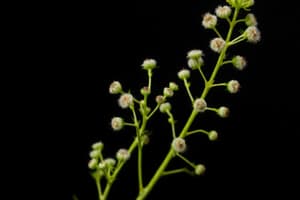Podcast
Questions and Answers
Which branch of botany focuses on the internal structure of plants?
Which branch of botany focuses on the internal structure of plants?
- Plant Taxonomy
- Ethnobotany
- Plant Ecology
- Plant Anatomy (correct)
What is the primary function studied in plant physiology?
What is the primary function studied in plant physiology?
- Plant classification
- Plant reproduction
- Plant morphology
- Photosynthesis (correct)
Which process involves the conversion of light energy into chemical energy in plants?
Which process involves the conversion of light energy into chemical energy in plants?
- Transpiration
- Respiration
- Pollination
- Photosynthesis (correct)
What does plant ecology primarily study?
What does plant ecology primarily study?
Which branch of botany is concerned with traditional uses of plants by cultures?
Which branch of botany is concerned with traditional uses of plants by cultures?
What is a key focus of conservation biology in botany?
What is a key focus of conservation biology in botany?
Which technique is commonly used to study plant cells at the microscopic level?
Which technique is commonly used to study plant cells at the microscopic level?
What are the two main types of plant reproduction?
What are the two main types of plant reproduction?
Flashcards are hidden until you start studying
Study Notes
Definition of Botany
- Study of plants, including their structure, properties, and biochemical processes.
- Encompasses plant classification, physiology, morphology, ecology, and genetics.
Branches of Botany
-
Plant Anatomy
- Study of internal structure of plants.
- Focuses on tissues and cells of plants.
-
Plant Physiology
- Investigates the functions and processes of plants.
- Covers photosynthesis, respiration, and reproduction.
-
Plant Ecology
- Examines the relationships between plants and their environment.
- Studies plant distribution, abundance, and interactions with other organisms.
-
Plant Taxonomy
- Classification and naming of plants.
- Organizes plants into groups based on characteristics.
-
Ethnobotany
- Studies the relationship between people and plants.
- Focuses on traditional uses of plants in various cultures.
-
Paleobotany
- Study of fossilized plants and ancient vegetation.
- Helps understand plant evolution and historical climates.
Importance of Botany
- Essential for food production, medicine, and ecological balance.
- Provides knowledge for conservation efforts and biodiversity preservation.
- Contributes to understanding climate change impacts and solutions.
Key Concepts
-
Photosynthesis
- Process by which plants convert light energy into chemical energy.
- Produces glucose and oxygen from carbon dioxide and water.
-
Plant Reproduction
- Asexual (e.g., budding, fragmentation) and sexual reproduction (e.g., pollination).
- Involves processes like flowering, pollination, and seed dispersal.
-
Plant Morphology
- Study of the form and structure of plants.
- Includes roots, stems, leaves, flowers, and fruits.
Experimental Techniques in Botany
-
Microscopy
- Used to study plant cells and tissues at a microscopic level.
-
Genetic Analysis
- Understanding plant genetics through molecular techniques.
- Involves techniques like PCR and gene sequencing.
-
Field Studies
- Observational research conducted in natural environments.
- Helps understand plant behavior and interactions in ecosystems.
Current Trends
-
Sustainable Agriculture
- Focus on environmentally friendly farming practices.
- Emphasis on organic farming and agroecology.
-
Biotechnology
- Use of genetic engineering to improve crop yields and resistance.
- Development of transgenic plants.
-
Conservation Biology
- Protecting endangered plant species and habitats.
- Restoration ecology to recover damaged ecosystems.
Definition of Botany
- Botany is the study of plants, encompassing their structure, properties, and biochemical processes.
- It covers various fields like classification, physiology, morphology, ecology, and genetics.
Branches of Botany
- Plant Anatomy investigates the internal structure of plants, focusing on tissues and cells.
- Plant Physiology examines the functions and processes of plants, including photosynthesis, respiration, and reproduction.
- Plant Ecology analyzes the relationships between plants and their environment, studying distribution, abundance, and interactions.
- Plant Taxonomy classifies and names plants, organizing them into groups based on their characteristics.
- Ethnobotany explores the relationship between people and plants, focusing on traditional uses in various cultures.
- Paleobotany studies fossilized plants and ancient vegetation, aiding in understanding plant evolution and historical climates.
Importance of Botany
- Botany plays a crucial role in food production, medicine, and maintaining ecological balance.
- It provides knowledge for conservation efforts and biodiversity preservation.
- It contributes to understanding climate change impacts and developing solutions.
Key Concepts
- Photosynthesis is the process by which plants convert light energy into chemical energy, generating glucose and oxygen from carbon dioxide and water.
- Plant Reproduction encompasses both asexual (e.g., budding, fragmentation) and sexual reproduction (e.g., pollination), involving processes like flowering, pollination, and seed dispersal.
- Plant Morphology studies the form and structure of plants, encompassing roots, stems, leaves, flowers, and fruits.
Experimental Techniques in Botany
- Microscopy is used to study plant cells and tissues at a microscopic level.
- Genetic Analysis utilizes molecular techniques to understand plant genetics, involving methods like PCR and gene sequencing.
- Field Studies involve observational research conducted in natural environments, aiding in understanding plant behavior and interactions within ecosystems.
Current Trends
- Sustainable Agriculture focuses on environmentally friendly farming practices, emphasizing organic farming and agroecology.
- Biotechnology involves the application of genetic engineering to improve crop yields and resistance, leading to the development of transgenic plants.
- Conservation Biology focuses on protecting endangered plant species and habitats, employing restoration ecology to recover damaged ecosystems.
Studying That Suits You
Use AI to generate personalized quizzes and flashcards to suit your learning preferences.




